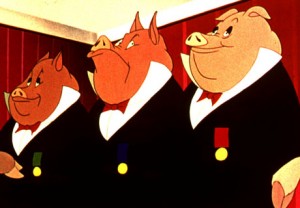Of course, with the year ending in the number twelve, we all should have realized it was the anniversary of the War of 1812, fought against Great Britain 200 years ago. It didn’t occur to me until I heard it mentioned on the radio. It’s also the Bicentennial of the Kentucky Militia Pig, one of the less famous stories from the 1812 war with England.
In fact, it was 200 years ago this month that all the frustrations, outrages, and humiliations put upon the citizens of our newly established country by the British finally boiled over. President James Madison signed the country’s first declaration of war on June 18, 1812 – not realizing completely what he was putting at risk.
It was just two years later that the White House and US Capitol were in flames, set ablaze during the occupation of Washington DC by British forces. It was during the Battle of Baltimore that Francis Scott Key wrote the lyrics that became our national anthem, the Star Spangled Banner.
Like all armed conflicts, all manner of stories have been handed down. The McHuston ancestry participated through the volunteered service of young Thales Huston, the son of Stevenson Huston, for whom the town of Hustonville, Kentucky was named. Thales and the militia from Lincoln County, Kentucky – walked from their farms to Ontario, Canada to take on the British Regulars under General Henry Proctor.
Kentucky Governor Isaac Shelby led the march, which is the beginning of the Kentucky Militia Pig Story.
After gathering at Harrodsburg, the Kentucky volunteers were just beginning their northward hike when they came upon two pigs engaged in a battle of their own. As men will do, the troops stopped their march in order to watch the pig-fight to its conclusion.
When the men resumed walking and were a couple of miles down the road, someone spotted the victorious animal following the troops at a short distance. When the men made camp for the night, they noted the pig also bedded himself down and arose with the new day to continue the journey.
According to Lewis Collins, in his 1877 book “History of Kentucky,” the volunteer force boarded a ferry to cross the river at Cincinnati, and “the pig, on getting to the water’s edge, promptly plunged in, waiting on the other side until the whole cortege crossed over, and resumed its post as customary at the flank of the moving column.”
In fact, the pig survived the battle and the return march to Kentucky; as a reward for his endurance of the hardships of military life, he was placed in the care of Governor Shelby, who cared for the patriotic porker for the rest of his years.
Thales Huston returned to the farm and his scallywagging ways, the sort of which prompted an elaborate legal document to keep his wife’s inheritance largely out of his hands.
The pig most likely enjoyed a better retirement, regaling his offspring with stories of the old war days, sleeping under the stars – pigs in a blanket, as it were.

Leave a Reply